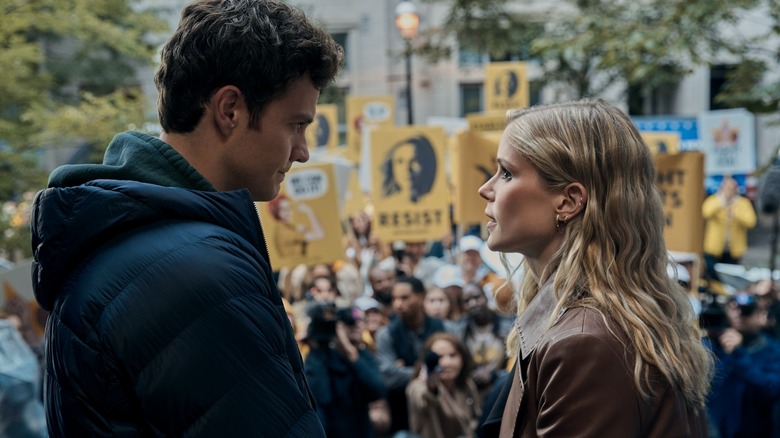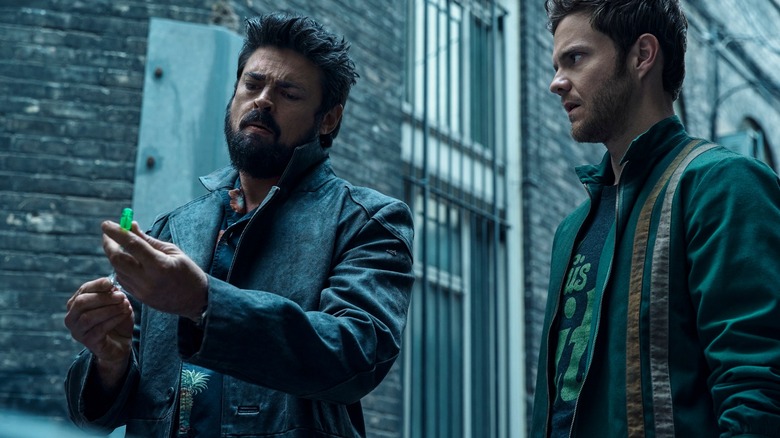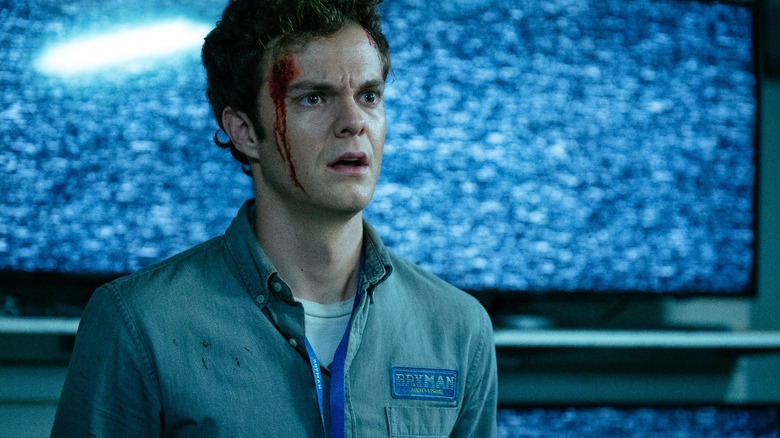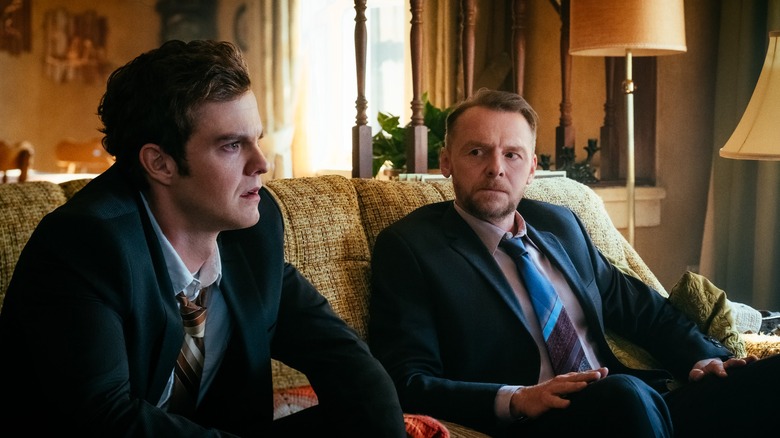The Boys Season 4 Features The Most Heartbreaking, Cruel Death Of The Series
This post contains spoilers for "The Boys" season 4 episode 5.
Sudden, unexpected deaths have always littered "The Boys" universe. The Prime Video series kicks off with a horrific death that alters the trajectory of Vought's schemes forever: Hughie's (Jack Quaid) grief-stricken rage snowballs into joining The Boys, ushering everything to come. This is a world where torsos have been smashed in, limbs have been torn to shreds, and heads have been popped on live television, underlining the unpredictable, violent reality of existing alongside supes. The boys have also been perpetrators of similar violence, even though their motivations have been rooted in a morally cloudy notion of justice so far. However, Episode 5 of the latest season ends with a death that feels pointedly brutal and needlessly cruel to the point that it fails to justify the bleakness enforced even after the credits roll.
Season 4 seems interested in pushing every character to contend with their past, be it Frenchie (Tomar Capone) wrestling with the guilt of murdering innocents or Starlight (Erin Moriarty) being forced to confront the more unsavory aspects of who she used to be. While some circumstances are more complicated than others, Hughie finds himself in an impossible situation, constantly torn between his duty as a son and the expectations that surround him as a member of The Boys, which seems to be crumbling under pressure. Previous episodes inform us that his father, the sweet Hugh Campbell Sr. (Simon Pegg), is in a coma after having a stroke, leaving Hughie devastated over his failure to be there for him when he needed him the most.
To make matters objectively worse, Hughie runs into his estranged mother (Rosemarie DeWitt) at the hospital, whose sudden return triggers his abandonment trauma and unresolved grief over losing her at the age of six.
Hughie and the Compound V dilemma in The Boys
To be able to forgive someone who deserted you without explanation is not an easy sentiment to navigate, and Hughie's mother does not make things easy at first, as her unwillingness to explain her lifelong absence exacerbates tensions between the two. This, coupled with the painful reminder of his father's imminent demise pushes Hughie towards seeking an unexpected cure: Compound V, which could undoubtedly prevent Hugh from dying. However, as Hughie is no stranger to V's debilitating effects on the adult body — having experienced a more unstable version of the drug some time ago — he decides not to administer the drug at the last minute. This painful, yet mature choice is immediately undone when Hughie's mother administers the super-serum without stopping to think about the repercussions, kickstarting a horrifying chain of events that should have never happened.
Grief can be a powerful narrative vehicle for character growth rooted in loss, as it puts forth one the most gut-wrenching truths of existence: the inevitable deaths of those we love. Hugh's imminent death after his stroke is tragic enough, as it underlines how little time Hughie has with his dad, where the seemingly insignificant moments he had previously taken for granted turn out to be the most precious in the end. Every little thing that Hugh loves or desires, such as his ardent wish to visit Paris and experience "The Da Vinci Code" exhibit, takes on urgent meaning after Hughie realizes he's about to lose his dad forever. This desperate, clawing pain feels more tangible than the extreme, manufactured trauma that Hugh is forced to endure after being injected with V, where his improved health comes at an excruciatingly terrible cost.
The price of letting go should never be so violently painful
Before Hugh undergoes hellish realizations about his newfound powers, he speaks to his son about letting go within the context of his mother's childhood abandonment. Hugh explains that he only ever wanted to shield his son from pain, being aware of his tendencies to cling to the people he loves, to the point that letting go feels impossible for him. The sudden and violent death of his childhood pet is brought up to illustrate this point, but this comparison rings hollow even within the context of familial abandonment, and the framing of Hughie's inability to let go as a personal failing.
Would a child ever be able to put down a beloved pet, putting humane mercy over heartbreaking grief in a moment that feels like the end of the world? Would a child also be able to let go of his once-doting mother, who abandoned him without explanation, only to resurface years later? Although Hughie suffers from emotional co-dependency due to nascent traumas, the moral framing for what he needs to do to "let go" feels like a severe disservice to everything he stands for, along with the emotional growth that the show has been nudging him towards so far.
After witnessing the horrors of V that wrack his father's crumbling psyche, Hughie realizes he must kill him in an act of mercy while making sure he feels loved and treasured in his final moments. "You're my hero, Dad," he states tearfully, before letting go of the man who shaped his kindest, gentlest instincts. The implicit contrast evoked between this heartbreaking moment and his inability to mercy-kill his pet is not lost, leaving an unsavory, bitter taste in the mouth after Hugh breathes his last.
Hugh Campbell deserves better
Since season 1, Hugh has been painted as a rather timid, well-meaning figure who prefers compromise over the discomfort that comes with standing up for what's right. This mindset is reflected when he urges Hugh to accept Vought's compensation after Robin's death instead of fighting back, trying to dissuade him from doing anything he might regret. This tendency toward inaction is not the result of complacent spinelessness, but the immobilizing fear of being an everyman in a world dominated by supes — Hugh knows that he lacks the strength or courage to live on the edge, and prefers the humdrum of immersing oneself in safe pastimes over the adrenaline-rush of subverting the norm. Although foundation-shaking courage is essential for change, not everyone can rise to such a challenge, especially amid trials and tribulations of their own.
To see such a man, who only ever chose passive gentleness, suffer so intensely is rather tough to watch, as it is more jarring than the audacious humor and shocking brand of violence that the series has sincerely embraced so far. The entire Compound V storyline that leads Hugh on an unwitting, distressing murder rampage underlines the show's tendency to favor visceral shocks with no inherent depth or meaning — this is tragic suffering just for the sake of it, meant to numb viewers instead of setting up narrative stakes that have a tangible impact. No amount of tactile bloodbaths can erase the uneasy notion of a grieving son having to kill his father after the latter suffers a lifetime of trauma within minutes, along with the glib life lesson tacked on to such a heartbreaking, sorrow-inducing act.
Even though Hughie insists he has made peace with this decision, this life-altering event is bound to come back and haunt him.



